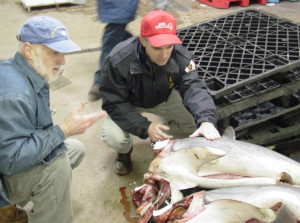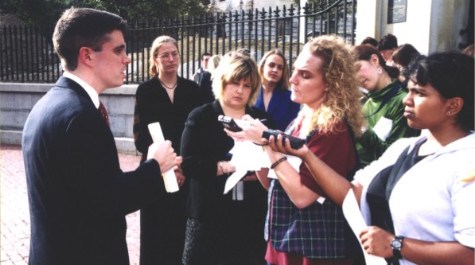Brian Golden '92
Soldier, Citizen, and Public Servant
Brian Golden '92 came to Williamsburg, Va., in the fall of 1989 because he wanted to study law in a quiet and quaint locale. While Williamsburg's historic roots and college-town charm exceeded his expectations, his years in law school proved anything but quiet.
Political, personal, and even philosophical battles awaited Golden during his time at William & Mary Law School, all of which prepared him for a career of public service as a soldier, a statesman, and a civil servant in keeping with the school's citizen -lawyer ideal.
He hailed from Allston, Mass., the backyard of Harvard University, bringing with him an undergraduate degree in government from Harvard's ivied halls. "Going away to college was not going away at all," he recalled. "The house I grew up in was closer to Harvard's main campus than many of the dorms."
So when it came time to choose a law school, he wanted something different. "I only looked at places that were far away," he said.
His motivation to go to law school, however, originated close to home. His father, a career police officer, modeled a life of service to people who needed individuals to work on their behalf. "The same things that made my father tick were the same things that pushed me to the law degree," he said. "The question was, 'What are your abilities and how can you harness them for the greater good?'"
When his father died at age 50 during Golden's second semester of law school, Golden was shaken. Quintessential law school concepts like consideration for contracts seemed inconsequential in light of bigger questions he faced. Another blow came when he took a sabbatical from his studies after his first year to pursue election to the Massachusetts State House. After a summer knocking on doors and calling voters, Golden lost the election.
Returning to law school would pose another challenge.
"I just lost my father, and I just lost this election. These are big things, and what I'm reading about is not," Golden said, recalling his frame of mind his second year of law school. "But with the passage of time the importance of that legal skill set revealed itself." Discouraged and not sure if he'd ever run for public office again, Golden pressed on in his studies.
In the months that followed, Golden developed an appreciation for relationships essential to any career, he said. The intimate size of the Law School allowed him to foster lasting friendships with classmates, such as his roommate, Richard Brooks, who spent his first summer managing Golden's campaign. Professors such as Dave Douglas would chat with him about legal history, the evolution of legal systems, and the rule of law, topics he would encounter repeatedly throughout his professional career.
"When I think of William & Mary, I think of my friends there," Golden said. "In so many ways, I learned that getting through demanding, difficult times would require supportive friends, and I had that there."
It was a lesson that would serve him well after he was accepted into the Army JAG Corps upon graduation. The opportunity aligned with his desire to serve the public and to carry on his father's legacy of public service.
Golden spent more than three years as an active duty Army lawyer. When the opportunity presented itself to re-enter the civilian world, he took it, becoming General Counsel for the Sheriff's Department in Boston. But he continued to serve the Army in the Reserves, traveling to Iraq to ensure U.S. compliance with the Geneva Conventions at detention facilities.
"The Red Cross is the arbitrator of the Geneva Conventions," Golden said. "I would accompany them and answer questions about our processes and make sure I was prepared to address any issues that were raised." He also reviewed files of Iraqi detainees alleged to present an imminent threat against coalition forces to determine if the charges had evidentiary grounds. Deciding who stayed in the detention facilities and who left proved a difficult and demanding task. "This might be a really, really bad guy, but I don't have any evidence," Golden recalled. "It's a complicated world, and you do the best you can to bring some kind of semblance of due process, understanding that you'll never know for sure that you got it right."
His service to the Army drove home an appreciation for the rule of law and for serving the public in ways that uphold it.
Given that appreciation, it is not surprising that upon his exit from full-time service to the Army Golden decided to run for public office. After sixteen months at the Sheriff's Department, Golden staged another campaign for the same Massachusetts House of Representatives seat he vied for in law school. "So much of this stuff is serendipitous," Golden said, explaining why he ran again. "The incumbent happened to leave the seat, I happened to be back in Boston, I happened to be in the same neighborhood I was in before. So the infrastructure was there, and my predisposition was there."
Eight years after losing his first election, Golden won his second election by 92 votes. "The first person I called was Richard Brooks, my roommate from William & Mary," he said. Voters returned him to the State House in the next three elections.
 Golden left the full-time responsibility of the State House to become Massachusetts Energy Commissioner in 2005, a position he was appointed to by then-Governor Mitt Romney. Next, the Bush Administration appointed him as New England Regional Director for the U.S. Department of Health and Human Services. He now serves as executive director of the Boston Redevelopment Authority, an entity charged with vetting the city's major construction projects, urban planning, and economic development.
Golden left the full-time responsibility of the State House to become Massachusetts Energy Commissioner in 2005, a position he was appointed to by then-Governor Mitt Romney. Next, the Bush Administration appointed him as New England Regional Director for the U.S. Department of Health and Human Services. He now serves as executive director of the Boston Redevelopment Authority, an entity charged with vetting the city's major construction projects, urban planning, and economic development.In the 17 years since he graduated from law school, he has held every job he could have dreamed of as a law student.
"When I came out of law school, I thought it was important to use my degree for public service," he said. "I was true to that and that has made all the difference."
What fuels his commitment to jobs that entail a high level of commitment and public scrutiny is the same passion that keeps him volunteering at homeless shelters, retirement homes, and serving on the boards of non-profit organizations in the little free time he finds as a father of three and soon-to-be four children.
"Especially in the legislature, you see the fruits of your labor on a really broad scale," he said. "But there is also a painful cost-benefit analysis. About thirty percent of what you do is extremely satisfying -- meeting terrific people during campaigns, hitting home runs for constituents who really need help, and working on major policy. On the other hand, seventy percent of the job can be quite difficult -- angry interest groups, media attacks, excessive time demands on nights and weekends, fundraising. There's a lot of tough stuff, but you've got to be willing to make these sacrifices for the thirty percent of the job that's mission-oriented and of lasting significance."
It's a lesson he learned early on from his father and from his time at William & Mary, where he developed relationships, skills, and a philosophical framework that would support his extensive public service as a citizen lawyer.
"When I think of my time at William & Mary, warm friendships stand out the most. It's a small school, in an intimate setting, in a beautiful part of the world. It allows nice relationships to develop. That made all the difference during some tough life experiences during my law school years -- the death of my 50-year-old father and a grueling election campaign and defeat," Golden said. "The legal skill set I took with me from William & Mary was of tremendous value; I've used it in every job I've done. But William & Mary also gave me a wonderful community from which I benefited. And in politics, the Army, and life generally, I continue to focus on friendships and openness to others as the cornerstone of a content, meaningful life -- both personally and professionally."
Editor's Note: In addition to Brian Golden, many Marshall-Wythe alumni have served or are serving in state legislatures. Some of our alumni who were recently elected to state legislatures include Robin Abbott (D), Class of 2001, who was elected in November 2009 to the Virginia General Assembly; Matt Gaetz (R), Class of 2007, who was elected in April 2010 to the Florida House of Representatives; and Lincoln D. Willis (R), Class of 2006, who was elected in November 2010 to the Delaware House of Representatives.



